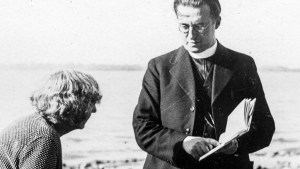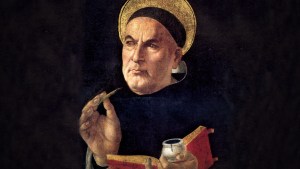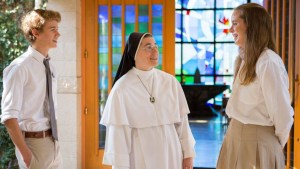School is starting again, bringing with it new backpacks, new pencils, new school clothes, and, hopefully, a renewed desire to learn, refreshed by days relaxing by the pool, playing baseball, or exploring at camp. I was always one of those students who was very glad for the school year to be over, and then equally glad for it to start up again. As nice as summer vacation was, I felt that pull back to the classroom, to books and chalkboards and learning.
But why was I drawn in this way? What was my motivation for learning? This is a good question to ask, and a good time to ask it. To guide us, let’s turn to some papal wisdom.
If you go to a site like papalencyclicals.net, you can comb through the writings of the Holy Fathers and find examinations of all sorts of topics. For example, Pope Pius XII, who reigned from 1939 to 1958, wrote encyclicals on atheism, Communism, poor children, and evolution, as well as on a number of saints.
And in an encyclical about St. Bernard of Clairvaux, hidden away like a gem, Pope Pius XII gives us food for thought on the purposes and motivations for acquiring knowledge.
St. Bernard lived at a time when the question of the relationship between philosophy and theology, between reason and faith, was coming to the fore. Theologians in the past had both used and despised philosophy. Tertullian famously wrote, “What has Athens to do with Jerusalem?” Yet the Cappadocian Fathers made great use of Neoplatonic philosophy in their meditations on the Trinity. In St. Bernard’s time, the logic of Aristotle was causing some, such as Peter Abelard, to challenge key doctrines of the faith. Thus St. Bernard questioned such men about why they pursued the knowledge they did.

Read more:
Bishop Barron takes on the myth that faith and science are enemies
In one of his sermons on 1 Corinthians, St. Bernard refers to St. Paul writing, “If anyone supposes he knows anything, he has not yet known as he ought to know” (or, in the words of Socrates, “The truly wise man knows that he knows nothing”).
St. Bernard takes this passage as a call to consider why we seek the knowledge we do. For some, it is nothing more than curiosity, wanting simply to know. (St. Bernard calls this “unseemly”—perhaps we might call this kind of knowledge “nosiness.”) For others, they desire knowledge so they can be known as the person who knows—this person is the “show-off.” Still others acquire knowledge only so they can make money off of it—the “mercenary” type (although this is the basic mindset of advertising for colleges). But finally, there’s the person who learns in order to “build up” or “be built up,” to bring knowledge to others in charity, and to become a wiser person and develop their virtue of prudence.
Treating knowledge as if it were an object to take possession of, put on display, and then sell to the highest bidder—this is how you treat a baseball card, not wisdom. Rather, St. Bernard tells us, we should seek knowledge in order to be “edified,” or set on a strong foundation. In gaining knowledge, we are “educated”—literally, “led out” of ignorance and into wisdom. And the ultimate wisdom, as St. Bernard reminds us, is salvation.
Our knowledge should lead us out of the darkness and into the Light that enlightens every creature, Jesus. It should help us to appreciate the proper place of all things in God’s creation, how they serve His purposes and can aid us in our journey of life. With every subject we study, we should strive to see how it can serve to “build us up” into Christian people.
So when you are sitting at your desk once again, taking notes as your teacher shows you a new equation or lists the presidents of the 19th century, remember what you are learning for. Remember where all knowledge derives. All knowledge, all reason, ultimately comes from the Logos, the Word, whose Spirit leads us into the truth that sets us free.

Read more:
A student’s prayer, by St. Thomas Aquinas

Read more:
What happens when religious sisters get back in the classroom

